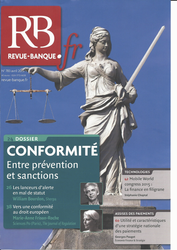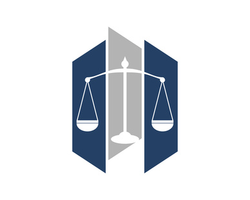The recent news
April 10, 2015
Publications

Référence complète : Frison-Roche, M.-A. Vers une conformité au droit européen, in Conformité. Entre prévention et sanction, RR, Revue Banque, n°783, avril 2015, p.38-40.
Lire un working paper en lien avec le sujet : Ce qui fonde la répression en matière financière.
Sous la forme de réponses à une dizaine de questions posée par Annick Masounave, il s'agit de mesurer l'évolution en cours et à mesurer du système de répression économique et financière en France.
Cette évolution est le fait des juges, les juges européens à travers l'arrêt Grande Stevens de la CEDH et les juges constitutionnels à travers la décision EADS .
Ainsi dès l'instant que "de fait", une personne est visée deux fois pour un même fait par une sanction de même envergure, le principe non bis in idem va fonctionner à son bénéfice et, même si la jurisprudence continue de protéger le pouvoir de sanction par la règle simplement procédurale de la proportionnalité, par exemple l'extinction d'une voie anéantit l'ouverture de l'autre. Car le principe est désormais posé - et c'est là l'essentiel - : la sanction pénale et la sanction administrative répressive ne sont pas considérées comme étant par nature (per se) et d'une façon définitive différentes l'une de l'autre (permettant donc toujours leur cumul, sous réserve du principe de proportionnalité), s'il arrive que les faits sont les mêmes, le reproche est le même et la punition est la même, alors il y a bien identité des sanctions.
C'était le cas pour le "manquement d'initié" et le "délit d'initié". Cela est le cas pour d'autres textes en droit financier. Mais la nécessité de qualification au cas par cas excède très largement le droit financier et irradie toute la répression économique.
Il faut tout revoir.
April 8, 2015
Teachings : Droit de la régulation bancaire et financière, Semestre de printemps 2015

Le droit français eut une grande place et une grande influence. Qui n'évoque le Code civil ? Que ne parle du Conseil d'Etat ? Cela n'est plus aussi vrai, à l'heure où l'on parle moins de la plume du Législateur, où l'on parle davantage des places, où l'on se soucie du pouvoir des Régulateurs américains ou mondiaux. La France s'est elle-même encastrée dans une idée juridique constituée par l'Europe. Elle n'en demeure pas moins par la force du droit.
Ainsi, la Régulation bancaire et financière est aujourd'hui construite à grande vitesse par des textes de droit communautaire qui plonge directement dans le droit français, par la mécanique de la hiérarchie des normes. Le droit communautaire touche aujourd'hui tous les secteurs, y compris le pénal qui constituait le régalien.
Plus encore, le droit de Common Law serait le droit le plus adéquat à l'économie et à la finance, ce que l'on pourrait appeler son "droit naturel", ce qui justifierait une domination allant de soi, les systèmes romano-germaniques devant s'effacer. La Banque Mondiale le soutient implicitement.
Mais le droit français continue néanmoins d'exister. Tout d'abord, parce que la hiérarchie des normes n'est pas moins subtile que le processus Lamfalussy. Ensuite parce que certains secteurs demeurent protégés de l'ouverture supra-nationale, par exemple l'énergie ou l'audiovisuel. Enfin, parce que le pouvoir politique français estime légitime de défendre les qualités de son droit, à travers la réforme du droit français des contrats qui se met en place, par une Ordonnance en discussion.
Accéder au plan de la leçon sur Le droit français dans la Régulation bancaire et financière
Accéder aux slides de la leçon sur Le droit français dans la Régulation bancaire et financière
Consulter la bibliographie sommaire et approfondie sur Le droit français dans la régulation bancaire et financière, ci-dessous.

April 5, 2015
Publications

Droit et Marché à première vue ne sont pas sur le même plan, l'un étant une construction, une invention humaine, l'autre étant des marchés. Mais depuis le XVIIIième en Europe, l'on a pareillement institué, donc inventé le "Marché".
Ces deux institutions ont un rapport dialectique, puisque c'est par le droit que le Marché a été construit. La puissance des institutions dépend de ceux qui les construisent mais surtout de la foi de ceux qui les contemplent. Or, si le Droit a construit le Marché, aujourd'hui la foi se tourne vers le Marché et la croyance d'une loi qui lui sera proche et naturelle le rend universel, transportant avec lui sa "petite loi" juridique qu'est le contrat et le juge qui y est inclus, l'arbitre.
Plus encore, parce tout cela n'est qu'affaires humaines et donc affaires de pouvoir, la place de l'Institution qui fût celle de la puissance, tirée de sa source, par exemple le Peuple Constituant, est en train de descendre en-dessous de ce qui est là, c'est-à-dire le fait. En effet, que peut-on contre un fait ? Seul Dieu, et donc une Assemblée parlementaire par exemple qu'il est aisé de destituer, peut prétendre lutter contre un fait. Or, le Marché est aujourd'hui présenté comme un fait, tandis que ce qui le gouvernent seraient des phénomènes naturels, comme l'attraction entre l'offre et la demande, le fait d'offre ce qui attire, le fait de demander ce que l'on désire. Dès lors, seul Dieu, souvent brandi avec grande violence, peut prétendre encore dire quelque chose contre cela.
Aujourd'hui, Droit et Marché sont face à face. Curieusement les juristes sont assez taisant, peut-être sidérés de la destitution du Droit. Mais c'est la question de la Loi première qui est en jeu. Dans l'esprit occidental, depuis la pensée grecque l'on a pensé le sujet et la personne comme étant première, c'est-à-dire posée sans condition. Si on pose comme loi première l'efficacité de la rencontre des offres et des demandes, le monde a changé. Un monde sans Personne, avec des êtres humains plus ou moins attrayant, plus ou moins demanding , le monde des puissances ayant remplacé le monde de la volonté égale de tous. La technique devient la préoccupation première. Le droit qui était "art pratique" et les lois faites pour l'homme, devient une technique et les juristes se devront alors d'être neutres.
Depuis quelques décennies, Droit et Marché sont donc face-à-face (I), mais le Marché semble en passe de dominer parce qu'il est en train de quitter le statut inférieur d'institution pour accéder à celui, universel, de fait (II). L'enjeu devient alors de mesurer les effets d'une telle évolution et de déterminer, si le Droit devait s'effacer, quelles normes viendrait le remplacer (III).
April 1, 2015
Teachings : Droit de la régulation bancaire et financière, Semestre de printemps 2015

L'on apprend le droit, on le définit même, à travers la notion d' "ordre". Mais lorsqu'on le rencontre dans la réalité de la Régulation bancaire et financière, tout à la fois on le rencontre à chaque pas et cela s'opère dans un vaste désordre. Cela est sans doute le reflet du vaste et peut-être définitif "désordre mondial" dans lequel nous vivons.
"L'affaire BNP" est un cas d'école. Ce qui a coûté à l'entreprise, les tensions qu'il engendre entre les États, les interrogations qu'il ouvre viennent aussi du fait qu'il n'y a pas d'autres entre des zones géographiques qui ne sont pas articulés par le droit, alors que l'activité des entreprises est mondiale.
L'Europe est une zone qui est en train de se construire mais, même en se limitant à la perspective juridique, les deux Europes - celle des marchés bancaires et financiers - et celle des droits de l'Homme s'articulent mal, les États-membres s'exprimant désormais à travers leurs Cours constitutionnelles.
Plus encore, la géographie rejoignant ici l'Histoire, l'Europe contient à la fois du Civil Law et du Common Law, le droit du Royaume-Uni demeurant fidèle à son Histoire. De la même façon, l'Europe des droits de l'Homme n'a pas la même histoire que l'Europe de l'Union européenne. Dès lors, comment faire l'Europe par le droit ?
Accéder au plan de la leçon : Géographie et histoire dans le droit de la régulation bancaire et financière
Voir les slides de la leçon sur la Géographie et l'Histoire dans le droit de la régulation bancaire et financière.
Consulter la bibliographie de base et d'approfondissement afférente à la leçon sur la Géographie et l'histoire dans le droit et la régulation bancaire et financière, ci-dessous.
March 27, 2015
Publications

The cost issue of regulation is a recurring issue.
One can complain specifically, when companies are protesting about the "cost of regulation" or when the topic is taken as an object of study, through the cost / benefit calculation.
A practical question of importance is whether there is a "legal question" or not.
The "juridicity" of a question is defined by the fact that discussing about this question has an effect on the outcome of a case before a judge. This concrete definition, leaving the judge's power, binding nature of the rule (here the balance between cost and benefit) the effectiveness of its decision before the judge, its consideration by him in the decision he makes, has been proposed in France by Carbonnier. It is opposed to a definition of Law by the source, the author of the rule, which identifies law for example through Parliament Acts, because the text is adopted by the legislator, listed source of law.
The first definition, more sociological, more flexible, giving the spotlight on judge better corresponds to a legal system which gives more room for ex post and for the judge. It is logical that we find more demonstrations of this conception in the common law systems.
However, the issue of cost / benefit is being debated before the Supreme Court of the United States, about the latest environmental regulations, adopted by the Environment Protection Agency (EPA). It is a question of law. It is under the empire of the judge.
For it is in this light that President Barack Obama in November 2014 asked a very costly regulation, and it was under his leadership that the Environmental Protection Agency has developed texts. Indeed, pollution of certain plants are the cause of asthma and laid in public health imperative to fight a regulation that results in a direct cost on firms. Indeed, some plants pollution is the cause of asthma and President Obama has asked public health imperative to combat by a regulation that results in a direct cost on the industry. The regulations adopted in 2012 they cost a $ 9 million, some claiming that future ones could result in billions of costs directly related to business The President emphasized by stating that the health of children was priceless.
By challenging those of 2012 before the Supreme Court, in the case Michigan v. EPA, this is the other texts that conservative states and companies have in mind because it is the principle that is posed: : does A regulator have the right to take regulations very "expensive" when the advantage, however legitimate it is, is small-scale in terms of costs? The Supreme Court, having chosen to handle the case, listened to March 25, 2015, the arguments of each other and discussed the case.
The question is the integration or not into the constitutional notion of "necessity of the law" of the "cost / benefit" calculation. This is a crucial point because the concept of "necessity of the law" is a common notion to the constitutions of many countries.
However, not only the so-called judges "conservatives" as Justice Antonio Scalia, took position felt it was crazy not "consider" the cost of new regulations from the expected health benefits, but also Justice Stephen Breyer called "progressive," said "irrational" the environmental regulator has not taken in consideration such an imbalance between cost and benefit.
It is true that Justice Breyer was formerly professor of competition law at Harvard.
Judgment will be given in June.
March 25, 2015
Teachings : Droit de la régulation bancaire et financière, Semestre de printemps 2015

En droit, la banque et la finance n'étaient pas jusqu'à récemment européenne. Les structures juridiques par lesquelles les entreprises continuent de devoir s'incarner continuer de ne pas l'être, la "Société Européenne". Pareillement, l' espace sur lequel se meuvent les banque, l'Europe, était à la fois trop grand par rapport à la souveraineté de l'État, et trop petit par rapport à la globalité de l'activité, mieux servie par le contrat, espace autonome, apte de ce fait à être global.
L'Europe n'a pu exister que sur décision politique. Or, l'impulsion politique date de 1945 et a conduit à un marché concurrentiel des biens et des services, dans lequel la spécificité financière et bancaire n'avait pas lieu d'apparaître. Plus encore, l'Europe eut tendance à détruire la banque et la finance, les réduisant aux notions d'entreprise et de service, réduction exprimée par les directives MID.
Le fait que d'une part la banque et les marchés financiers soient le nerf de la guerre économique des biens et des services n'étaient pas suffisant, dans la mesure où la notion d'entreprise elle-même, pas plus que la politique industrielle, n'ont été constitutive de l'Europe. C'est la crise financière de 2008 et 2009 qui a, par une réflexion régressive, mené au retour en arrière sur la destruction de la finance par la concurrence d'une et par la construction de l'Union bancaire d'autre part.
Il a été posé que les prestations financières ne pouvaient être régies par le seul contrat, sauf à créer des risques systémiques. Plus encore, s'est construite en un temps record et unique dans l'histoire une Union financière, puis une Union bancaire en deux piliers, dont commencent à se déployer les effets.
Accéder au plan de la leçon sur l'Europe bancaire et financière.
Regarder les slides correspondant à la leçon sur l'Europe bancaire et financière.
Consulter ci-dessous la bibliographie sommaire et approfondie pour la leçon sur l'Europe bancaire et financière.K

Updated: March 20, 2015 (Initial publication: Jan. 28, 2015)
Publications

La répression est indissociable de la façon de réprimer. C'est pourquoi les difficultés de procédure sont des révélateurs de problèmes de fond. Actuellement, le problème de fond mis à jour par les batailles autour des procédures de sanctions en matière financière est ce pour quoi sont faites les sanctions.
Pour le régulateur, la sanction est un outil parmi d'autres pour réguler les marchés financiers. La sanction, dans un continuum avec son pouvoir normatif, sont ses dents et ses griffes grâce auxquelles les marchés financiers se développent. Cette finalité de politique financière justifie une répression objective avec un système probatoire reposant souvent par présomption conduisant à imputer des manquements à des opérateurs dans certaines positions sur ou à l'égard des marchés. Le régulateur doit avoir cette carte en main et l'utiliser selon cette méthode.
Par ailleurs, s'il arrive que des personnes commettent des fautes reprochables et ressenties comme telles par le groupe social, il convient qu'elles soient punies, jusqu'à la prison. Seule la justice pénale est légitime à le faire, légitimement alourdie par la charge de prouver l'intentionnalité, etc.
Il faut distinguer ces deux catégories d'incrimination. C'est à partir de là que les deux procédures et les deux systèmes probatoires peuvent se dérouler en même temps, mais sur des incriminations différentes. Pour l'instant cela n'est pas le cas, car les "manquements financiers" ne sont que le décalque des "délits financiers", allégés des charges de preuve qui protégeaient la personne poursuivie et qui doit pour l'instant répondre deux fois.
Problème de procédure ? Non, problème d'incrimination, dont on ne sortira pas par des solutions procédurales, la plus hasardeuse étant de créer une nouvelle institution, la plus calamiteuse était d'affaiblir le système en supprimant une des voies de poursuites, mais en distinguant dans les incriminations qui sont pour l'instant redondantes.
Ainsi, la répression comme outil de régulation utilisée par le régulateur est au point, mais le véritable droit pénal financier demeure à consolider pour atteindre son objectif propre et classique : punir les fautes, y compris par de la prison.
C'est au législateur de remettre de l'ordre. Il est possible que la décision dite "EADS" du 18 mars 2015 rendue par le Conseil constitutionnel l'y pousse.
March 20, 2015
Publications

Le 18 mars 2015, Conseil constitutionnel a rendu sur QPC la décision M. John L.. et autres, que chacun va appeler "la décision EADS".
Il est clair que le cumul de poursuite à la fois pour manquement d'initié et pour délit d'initié est déclaré non-conforme à la Constitution. Enfin.
La question pertinente est celle de la portée de la décision.
La lecture de la décision montre que sa portée est considérable. En effet, la jurisprudence jusqu'ici, Conseil d'Etat et Conseil constitutionnel confondus, affirmaient per se qu'une sanction administrative ete qu'une sanction pénale n'ont pas la même nature.
Or, dans la Décision EADS, c'est fini : le Conseil constate que délit d'initié et manquement d'initié ont la même nature. Dès lors, le cumul n'est pas possible.
Il va falloir pour tous les autres cas, devant toutes les autres Autorités de concurrence et de régulation, examiner si la sanction administrative et la sanction pénale ont de fait la même nature ou non. Au cas par cas.
Le droit a donc changé le 18 mars 2015. Le Conseil constitutionnel montre que l'efficacité, socle de ces mécanismes de cumul, n'est pas tout et que les principes de procédure, par exemple non bis in idem, dès l'instant qu'il y a identité de nature, prévalent.
Accéder à l'article de presse.
Voir ci-dessous les liens pertinents vers les décisions et institutions citées citées.